Hello and welcome to Episode 16 of the What China Wants podcast.
In the back and forth over climate change, something that doesn’t get mentioned too much in the rain-sufficient West is a lack of water (California and parts of Australia aside). But in China, the recent drought that has hit large swathes of the country has laid bare the immense threat presented by drying rivers and lakes. Agriculture, manufacturing, energy production - all have been badly hit, and already-fragile growth rates will likely have been further damaged.
To discuss this we interviewed two experts on the matter. Gabriel Collins is an academic specialising in water at Rice University's Baker Institute, and Gopal Reddy, the founder of Ready for Climate, a platform for cutting-edge research focused on the national security and macroeconomic risks of the climate crisis.
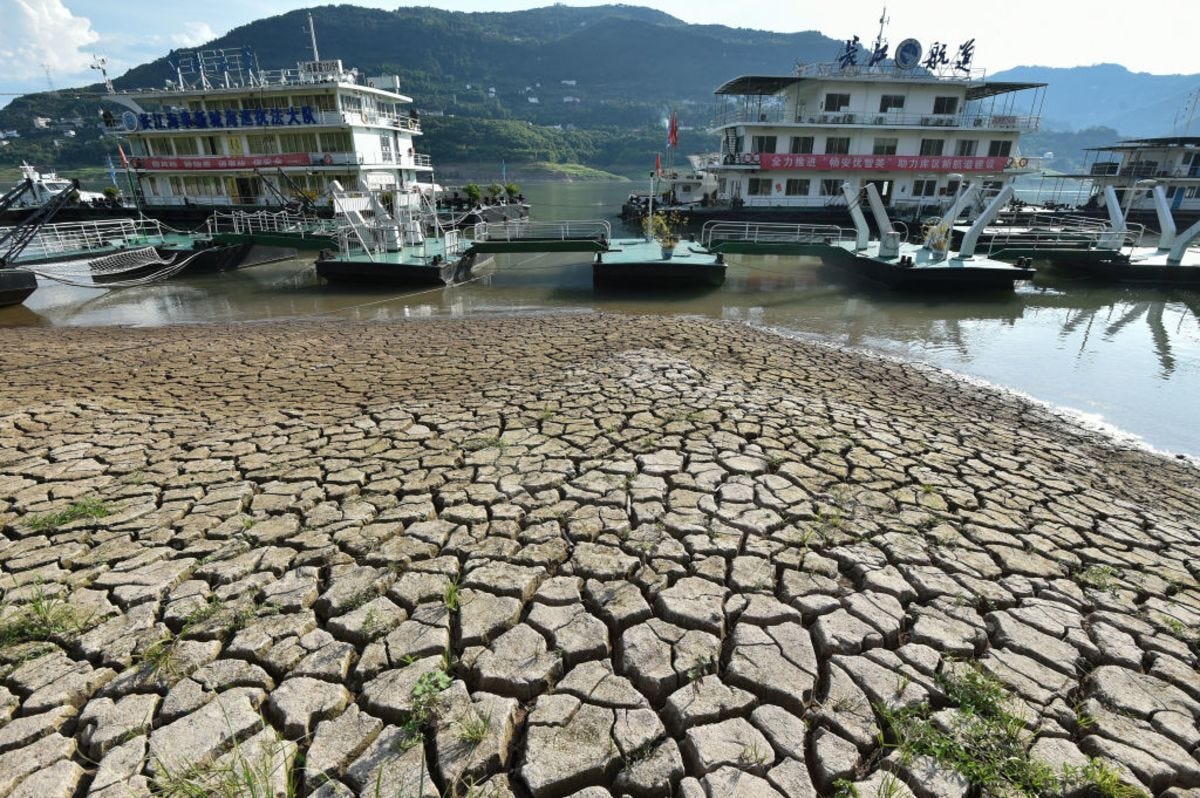
Some highlights from our discussion:
China normally experiences a dry north and a wet south, but this year both regions are dry.
This is on top of an already difficult water situation across the country, which suffers in part from water scarcity worse than Egypt.
Even though China is spending heavily on infrastructure to ease the water scarcity burden, there is a long way to go given how bad the situation has become (and not just during this drought).
With 60% of water used for agriculture and 20% for industry, there are concerns about how water issues will impact China’s growth and its social stability.
Not only that, but the country relies on hydroelectricity for 20% of its generating capacity, so power outputs are now down.
Water shortages are likely to impact China’s domestic policies but also its international ones too, including arguing with its neighbours over watersheds and trying to secure more food sources in case agricultural yields collapse.
You can access Gopal Reddy’s report on China’s water shortage here.
You can also listen to the podcast on Apple, Amazon, or Spotify.
As always please do share, comment, and subscribe. We’ll be back next week with more What China Wants.
Many thanks for listening.
***
Here is the transcript:
Sam Olsen: Hello, and welcome back to What China Wants with me, Sam Olsen, and with Stewart Paterson as always. So, Stewart, you and I have spoken quite a lot about resources regarding China, and in fact, we talked about a few of them last week, but none so more important than water. I thought I'd start today with a quote about the issues facing China with regard to H2O.
"China's water situation is particularly grim. The country possesses 20% of the world's population, but only 7% of its freshwater. Entire regions, especially in the north, suffer from water scarcity worse than that found in a parched Middle East. Thousands of rivers have disappeared, while industrialisation and pollution have spoiled much of the water that remains. By some estimates 80-90%, of China's groundwater, and half of its river water is too dirty to drink. More than half of its groundwater and one quarter of its river water cannot be used for industry or farming."
That, Stewart, does not look to me like a recipe for success, either economically or socially. I think it's best for us, rather than just to talk about it amongst ourselves, to get some guests on. And we have two expert guests on the very topic today, including the author of those words.
Stewart Paterson: Yes, Sam, indeed. It's always good to have some experts on we're lucky today to be joined by two leading experts on the environment, and in particular where China is on water. Gabriel Collins is the Baker-Bots fellow in Energy and Environmental Regulatory Affairs at Rice University's Baker Institute, and the author of over 100 papers on the subject. And Gopal Reddy has a similar background to myself actually, having spent years in financial services, before leaving his hedge fund that he founded, Chakra, to set up the Ready For Climate organisation, which aims to provide its readers with the information required to make rational decisions and understand the process of climate change.
Thank you both very much, indeed, for joining us. It's a great pleasure for us to be hosting you. Gabriel, maybe I could turn to you first with a question. As Sam's quote implies, the water situation in China structurally appears to be pretty dire. Those statistics all came out rather quickly from Sam's mouth, perhaps you could just elaborate on it and try and explain to our listeners exactly how bad the situation is.
Gabriel Collins: The challenge is that there is a structural deficit of water that's been fairly long standing in northern China. To get a sense of what the North China Plain means within the country is, in terms of grain production, if you imagined what Iowa, what Illinois, what northern Missouri and some of these other areas in our corn and soybean belt mean, here in the United States, the North China Plain is the rough equivalent. The problem is it is far drier. They have been groundwater dependent for a long time, and you see the deficit steadily building.
The other dynamic that we are seeing play out, and it's been very much enforced this summer, is actually dryness in southern China. Historically, you have had a dry north and a wet south, and what we have seen this summer is dry in both areas. Particularly because a lot of the engineering schemes that China wants to use to compensate for the water deficit in the north are predicated on bringing water from the south, it's a real, systemic challenge. And it's a multi-region challenge in a way that I think hasn't been seen for a while there.
SP: Interesting. And of course, huge infrastructure projects in China aimed at redistributing water are not new, are they? That goes back, Sam, from your history - you'll remember that the big canal projects were a major part of Imperial China weren't they?
SO: Yes, Yu the Engineer and his ilk from earlier than 1000 BC. In fact, it is ironic that Xi Jinping recently was visiting parts of China which were devastated not by drought, but by flood. There he was referencing Yu the Engineer and previous generations of water tamers and said that "we have to tame the water before the water tames us" or words to that effect.
But it looks like now that the realities of the most critical situation are coming forth, and that is around drought.
In fact, I'm looking at your Ready for Climate website, Gopal, and you mentioned here that Wen Jiabao, who was China's premier in the mid 2000s said that water shortages, in fact threaten the survival of the Chinese nation. Is that hyperbole or do you think that there really is a big problem for China now and in the future?
Gopal Reddy: I don't think that is hyperbole at all. Again, I would emphasise that, based on his comments, as well as Xi's comments, and those of many other senior CCP party members, there is a clear understanding of the water shortage problem. Just to give you some sense of scale here when we were looking at China's major cities, and we're talking about Beijing, Shanghai, Shenzhen, Hong Kong, amongst others, the local water resource on a per capita basis is roughly half of what it is in Egypt. So we're talking about a seriously dry environment in terms of water resource available. And unlike Egypt, China is obviously running a lot of industrial processes and manufacturing facilities which further consume water.
So it is a very serious situation, and one thing I would point to is that China has made some significant investments to try to reroute water from South China to North China. Gabe touched on that a little bit, there's the South-North Water Transfer project, which was a $60 billion investment. Just last month, there was an announcement of a plan to build a new tunnel from the Three Gorges Dam up to Beijing, which would seem to imply that the South-North Water Transfer project, its water supply is not adequate to solve the problem.
SP: So is China reaching a point then where it's going to have to choose between using water for agricultural purposes or using water for industrial purposes? Because, as I understand it, China makes about a billion tonnes of steel a year, it's about half of the world's steel production. And yet, steel, if I remember rightly, is one of the most water-intensive industrial processes you could use. So that doesn't strike me as being a bright and intelligent use of what seems to be an incredibly scarce resource in China.
GC: One of the challenges I think, actually, is even if we step a little bit further back than steel, as you think of one of the most fundamental commodities of all for modern humanity - obviously, setting water itself aside, and food aside - is electricity. I think, actually the electricity and coal space, that's where we see perhaps some of the broadest non-agricultural effects of these water shortages. We have really seen it in spades this summer, with the hydropower shortages coming out of Sichuan.
There's a couple of dimensions to this, there is a political management dimension where you have a system that still much more ‘command and control’-based than some of the market-based approaches that we're used to in Western Europe or in the United States, for instance. But even taking some of the management element out of the equation, it is a massive fundamental challenge if you're getting 20% of your electricity, basically directly from water in the form of hydropower, and then when a lot of your coal-fired power plant fleet requires enormous amounts of water for cooling, and you also need water to process coal and prepare it for combustion. And also to move coal, if you think about the impacts on a river system on your barge traffic when water levels fall, they can be tremendous.
Again, these are things that are matters of physics. We see this happen sometimes in the United States, we have seen it this summer in the Rhine River Basin in Europe. So it's a whole interconnected set of challenges, and I think almost the entire basic materials class, whether it's direct water usage, as you have referred to as steel, or whether it's more indirect in terms of electricity-intensive industries being impacted by power shortages, that again, even before we get into food, it's a very systemically impactful set of events we're seeing unfold.
GR: Yes, and just to give some sense of this distribution of water consumption in China, roughly 60% is for the agricultural sector, 20% is for power generation and manufacturing. The rest is roughly split between just general use and household use. So when you when you look at from a country level standpoint, where are the opportunities for China to maybe find additional water savings?
The challenge in the agricultural sector, and this is something that Gabe, really highlighted in our published work, is that China has a long standing policy of food self-sufficiency to the highest extent that they can possibly get. So, if cutting back water for the agricultural sector would impact crop yields, I think that's a politically very, very difficult thing to push through.
When you're talking about household usage in China, households in China are actually very efficient in their water usage, especially compared to us in the US, so there's not a lot of savings to be had there. That really leaves the onus on the power generation sector and the manufacturing sector just to square the math when you have water shortages or power shortages resulting from water shortages. Over the course of the last 18 months, you've seen these periods of rolling blackouts in various regions within China, and inevitably what's getting impacted the hardest is the local manufacturing facilities as they're forced idle.
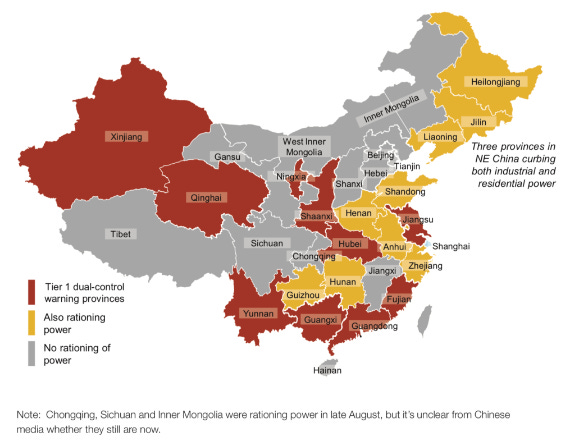
SO: Now, actually, I will just press you on one point there, which about agriculture and water savings. Because in the West, there's certainly been a lot of talk recently about how much saving of water within agriculture environment can be made, if you use technology. Two examples spring to mind. First of all, drip irrigation, and the use of more advanced tractors and more just general machinery on the farms. And secondly, is lab-grown meat, which according to one report published a couple of years ago, which suggested that lab-grown meat had 1% of the water requirements of normal, 'field-grown' meat.
So to what degree are we looking at China trying to adopt new technologies and new methodologies within the agricultural sector, specifically with water rations in mind, or has that actually not come to pass yet?
GC: If you are looking at some of the agricultural efficiency improvement technologies, I think one of the big barriers that we see to-date in China is that the scale of farming is typically much less than for instance, what you see in a lot of breadbasket regions of the world, the United States, Brazil, Argentina, Ukraine, Russia. Here, we tend to measure big farming operations, in terms of many thousands of hectares. In China, I'm forgetting what the average farm size is, but it is basically on the order of maybe a couple of hectares, they tend to be much smaller on average.
The problem with farm consolidation is again, that it becomes very politically tricky, because you have already had a big flow of people come off the land and into the cities as migrant workers. So you sort of ask, where would be the new places if you had another round of agricultural reform, and if you had real land consolidation? I think what would put an especially fine point on that question now is we see the real estate slowdown in China. If you look at the sectors that really absorb that groundswell of people coming off farms and into the cities, one was manufacturing, you have kind of your prototypical experience of somebody going to work in the Pearl River Delta factories or elsewhere. But the other big source of absorption, especially for male workers coming off the land, was going to work in the construction sector. So, if you have a real estate slowdown, and I think arguably an incipient slow-motion real estate crisis taking shape, and you're juxtaposing that against what people might do, if there is farm consolidation and less need for their labour there, I think, again, it really highlights the political tightrope that the government is walking.
And I think, probably to come back to some of the things we talked about earlier, engineering-based solutions, I think, are inherently attractive when you have a government with the technocratic bent that China's does and this long history of hydraulic engineering. But I think probably one of the other reasons that engineering-based approaches may appear attractive as they help you look like you're taking decisive action, but also without having to fully jump two feet into dealing with some of these politically tricky dimensions that we're talking about.
GR: Yes, and Sam, just to add on to that, you mentioned some of the opportunities maybe on the food side, whether it is reducing meat consumption or finding alternative ways. There are steps that can be taken in terms of reducing the water consumption by reducing meat consumption in China. But that becomes, again, a very politically difficult thing to message from the standpoint of the government. If you have to tell your citizens that they need to modify eating behaviours because of water shortages, I think it starts to raise a whole host of other questions, and this is something we've highlighted in the work. As far back as 2016, the Chinese government was asking people to switch from eating rice to eating potatoes because growing potatoes is far less water-intensive. But the messaging and the enforcement are two different things.
GC: I'll give you an anecdote even from my time in China. You could find potatoes on the menu, and actually when you stir-fry potato cubes with all the sauces and wonderful flavours they have there, it's superb. But I think I was the only one in the entire restaurant that was willing to order the potato. Everything else was rice.
SO: In all my travels in China, I have never seen potato stir-fry, but I might cook it tonight.
GC: Oh they're good.
SP: Gentlemen, we have talked mainly so far about the long-standing structural issues which are obviously getting worse, but in the last eight weeks or so, China has experienced some really horrific weather events in terms of heatwave and lack of rainfall. Perhaps you could, Gopal, just update us on what the situation is there, and just quantify a bit for our listeners, just how unusual this is in terms of records being broken, and for both heat and lack of rainfall.
GR: So what I would stress is, obviously, these are in recent history, unprecedented events in terms of the weather impacts, especially in central China. What I would point to is, when you look at the response to the Chinese government to this problem, again, what you're seeing happen is you're getting the immediate effects of power shutdowns here and there.
But, one of the more interesting aspects of how China is trying to manage through both acute and long term water shortages is through the use of what's called cloud seeding technology. If you are not familiar with it, or if your audience is not familiar with it, this is basically when you when you use rockets, or drones and you release silver iodide or carbon dioxide into the atmosphere to try to induce rainfall when the weather patterns are accommodative. China has already announced plans to cover half its landmass by 2025 with cloud seeding programmes, and in recent weeks, there's been a lot of announcements about stepped up activity on cloud seeding, particularly in Szechuan province.
One of the side effects of cloud seeding is that it tends to induce much more severe storm events. So it will be interesting to see over the next weeks-to-months, whether you start to see heavier storm events occur within certain provinces. And this is something that, again, Gabe has highlighted. One of the big problems is when the ground itself is extremely dry, you may get a tonne of rain in a very short period of time, but it basically all just runs off into the ocean because the ground is too dry to absorb it.
SP: So not a solution of any sort of lasting nature?
GC: I'm not sure if we fully know that. I think part of what we're seeing play out in real time here, as Gopal's referring to with just the sheer scale of Chinese efforts, is this is basically real-time geoengineering in a way. I think one of the dimensions this actually highlights is there's so much focus in Western Europe, and I think, to an increasing extent in the United States on trying to do things to restrain emissions, and hopefully avoid different climate change impacts. I think what's really interesting in China, is that there's a really robust, not just conversation on adaptation, but I think there are a lot of things that we already see being put into place.
I think with this cloud seeding programme, one of the things you see is one of the larger scale ongoing experiments in geo-engineering. I don't think we fully know how it turns out if you're trying to manipulate weather patterns on that type of scale. Maybe it is something that is revolutionary, or maybe it turns into a modern version of Mao's campaign to have people kill sparrows in the late 1950s and early 1960s, which was a disaster. I think we don't fully know yet. But I have a suspicion that among other things, some of the neighbours who share rain sheds and weather sheds directly with China might be a little concerned. I think there is a potential that cloud seeding becomes just a wider spread form of some of the adverse impacts we already see from dams on the Mekong River and things like that for people who are downstream and in the same rain and weather shed. So, I think it's going to be very interesting to see how this ultimately plays out.
SO: That is actually a good segue to something that I'd like to talk to you about now, which is the effect of China's water shortages on his neighbours. Now, you must have been looking at this, perhaps more from the water point of view. But from a political point of view, and indeed a security point of view, what do you think the challenges are for China's neighbours when it comes to China's water issues?
GC: I think it starts with some of the shared river basins. I think the river basin that gets the most attention is the Mekong, and I also think some of the other rivers coming off the Himalayas, if you're living downstream, whether it's in India or Nepal, or Bhutan, or any of these other places, and in certainly in Southeast Asia, you'll have concerns about how the Chinese operate dams they are building upstream.
We have already seen, such as in the Mekong basin, for instance, that there has been water withholding. There is a whole series of dams on the upper reaches of the river in China, where you no longer see the normal seasonal flood patterns because they have been withholding water among other things to facilitate power generation. So, if you look downstream at Tonle Sap, the big lake in Cambodia, where you have seasonal flooding - people will fish during that time and get a big chunk of their year's protein haul. It's starting to affect things like that.
I think the other area also that maybe doesn't get as much attention but probably deserves it are some of the shared river basins on China's western boundaries, particularly, for instance, the Irtysh River and others that arise in Kazakhstan and the Xinjiang area, and then flow north. You have big hydraulic engineering projects in Xinjiang that are being quietly worked on as well. I think we don't yet know what the impacts are, but I would suspect that parties in Kazakhstan and probably Russia, also downstream are watching these with some degree of unease, because I would surmise that they're realistic enough to guess that the Chinese will manage these projects entirely in their own self-interest once they're completed.
GR: Yes and one thing that I think is a really important variable over the next five to 10 years regarding this situation is that there is a big question regarding how long glacial flows will continue from some of the upper reaches. So, when you are looking at China's river supply, a lot of that's being fed from the Himalayas or the Tibetan region. There is actually a short-term benefit to water supply as temperatures warm because the glacial sheets start to melt. And then the question is longer term that, you know, you may reach a point where that starts to reverse and we actually see those glacially-fed rivers start to dry up. That is when we start talking about catastrophic outcomes for that region.

SP: Can I just come in there on that? Are you suggesting that the current level of water supply in China is in fact already being augmented by melting glaciers, and so that benefit is already being had, as it were, and at some point, we will move into a process of those rivers producing less water?
GR: Yes, I have seen academic estimates suggest that come 2035 or so that the benefit from glacial melt off will start to reverse. I am not 100% fully detailed on some of those aspects of it, but it is a serious worry, especially given how important those glacially-fed rivers are, both to China and also neighbouring countries in the region.
SO: Just to talk one final time about the international relations impact. You mentioned in your report as well about the issues on food security relating to water scarcity. You say there about the fact that the water sheds on the neighbouring boundaries of China might be impacted by hydro-engineering schemes.
But looking at food specifically, it seems to me that one of the things that China is going to need to do if it has got chronic water shortages, is to secure more electricity from abroad considering 20% of its electricity is hydro. And secondly, is to secure a lot more of its food from abroad, if they cannot reform their agricultural sectors. This is going to have a large economic impact, not only on China's domestic economy, but also its international economy. Stewart, wouldn't you agree with that?
SP: Well, yes, I would. But I suppose the issue that our water experts would probably raise here is that countries such as Brazil, Australia, Canada, the United States that are large food exporters themselves, are presumably facing climate challenges of their own. I know in the case of Australia, clearly with the Murray Darling Basin, there are big issues in terms of water supply to agriculture.
Perhaps, Gabe, you could elaborate on that? Are there large, surplus producing countries in the world who are capable of upping their production to compensate for a decline in China's food production in an order of magnitude that makes a difference?
GC: Since we have multiple current or former investment professionals on here, I think you will appreciate the idea that timing is everything. And for this one, it's really the adjustment period. I think if you are just looking on a purely theoretical basis, and you look at the combined potential output increases that you could see from the southern cone of South America that you could probably even see from parts of the United States, from Canada, from Kazakhstan, from Ukraine and from Russia, among others.
If you're looking on a four-to-five-year timeframe, you can probably start to meet a larger Chinese call for imported grain beyond what we already see today. But in terms of what goes on during that adjustment period, it can be massively tumultuous. Especially if you're looking at some of the countries that are being impacted by, for instance, closure of shipping in the Black Sea over the past six months as a result of Russia's war in Ukraine, and then you imagine a larger magnitude event that plays out over more time, you can see how things potentially get pretty dicey with that.
And then so I think China's scale makes things very challenging because Saudi Arabia, for instance, as we talked about in our paper, has made a move to basically go to imports in order to conserve domestic water resources and quit using them for grain, but it's 1/70th of China's size.
SP: Well, it's been a fascinating discussion, thank you both very much indeed, Gopal Reddy, and Gabriel Collins. Sam, this is a fascinating topic and my mind is slightly spinning in terms of the ramifications for manufacturing raw materials, and the impact that that's going to have on the rest of the world, if China has to substantially cut back on its production. Plus, of course, you know, the potential for influence operations that China needs to pursue on food surplus countries in order to ensure some sort of compliance with their exports. As we know, China pursues an aggressive geo-economic policy when it comes to pursuing its self-interest. So that leaves us with plenty of food for thought.
SO: Great, you have really woken us up to the issue of China's water shortages. I honestly believe that this is probably one of the most chronic issues facing the country. But not just the country, of course, because as Stewart said, its influence globally, as well. Have you got any final thoughts about how China can turn this around and change things to think about things more happily?
GC: I think there are ways you can start dealing with this problem. I do not know if 'happy' is necessarily a word you will associate with it, especially if you're a Chinese leadership that has a Party Congress looming, which is about six or seven weeks from now. Repricing water, in some instances, I think, both for agricultural use, and also for industrial use in ways that incentivise greater efficiency, I think is something that would probably be pretty politically controversial, because people have got used to cheap water. This is not just a Chinese problem. This is a challenge here in the United States and in many other places, as well. And then, I think one of the other things repricing does is it makes you rethink some of your agricultural, almost near autarky in certain staple grains. But I think given the geopolitical climate and the evolutions we've seen there, I would be surprised if the Chinese government was ready to take big steps.
Among other things, when you see the intensity of discussion of this dual circulation policy, where basically, China's almost this semi autarkic hub that takes in raw materials as it needs them, and then spits out manufactured products to its huge domestic market and also to the rest of the world. If you are thinking about relying more on a global market to compensate for your domestic water insecurity, I think there is a lot of contradiction between those. And at least, Gopal may disagree, but I don't get the sense that this is a conversation that is one that may be there yet ready to have in an action-oriented way, or if they are, it's occurring very, very privately, and at least I haven't seen many manifestations of that.
GR: I totally agree with Gabe, and I think the one thing that we would highlight is that the solutions to China's water shortages are pretty much all politically very difficult, whether it's making shifts to manufacturing policy or trying to change consumption patterns or other drastic steps. None of these are very simple tasks, internally within China.
What I would also stress is that given China's huge influence on global trade patterns, a China water problem is the world's problem. This is an issue that's going to be exported out to the rest of the world, and particularly when we look at China's manufacturing sector, I think Western companies have become very comfortable with the idea of being able to increase their output from China by 5% or 10% or 20%, every year, if they need to. The numbers suggest that it will be very, very difficult for China's manufacturing base to continue to support long term growth of that kind of demand, less solutions are found for the water-power problems.
Again, just to highlight some of the challenges involved, one of the nice things about wind and solar power is that they don't require water resources to operate. But the downside of wind and solar power is that it's not dependable enough to run industrial facilities. So this is a case where, you know, if there are technology breakthroughs that happen in the next three to five to 10 years that could make a meaningful difference, there are steps that can be taken. But right now, the decision tree facing China is not particularly attractive.
SP: Gentlemen, thank you very much indeed. Sam and l will be back next week with another episode of What China Wants. Thank you. Goodbye.
GC: Thank you.






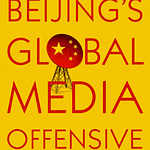
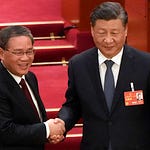
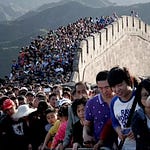



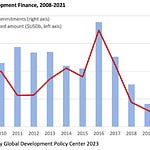
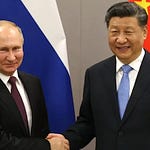
Episode 16: China's Water Crisis